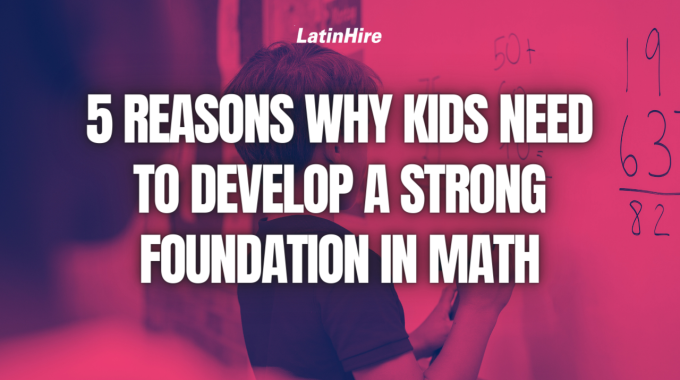As the weather warms up and we approach summer (in the Northern hemisphere), kick off…

5 Reasons Why Kids Need to Develop a Strong Foundation in Math
Mathematics is one of the most-feared subjects out there, but also one of the most important. It is often referred to as the language of the universe, and for good reason. Numbers have the same meaning no matter where you are in the world, and a solid understanding of how numbers and other mathematical concepts work is the foundation upon which many other subjects and practical skills are built. Just like a sturdy house requires a solid foundation, a child’s academic and professional success often hinges on their proficiency in math.
In this article, we’ll explore the importance of developing strong math skills from an early age and how it can benefit children throughout their lives.
1) Develop Critical Thinking and Problem-Solving Skills

Math isn’t just about playing with numbers; it’s about logic, reasoning, and problem-solving. When children learn math, they keep their brains active and develop critical thinking skills that are applicable across various domains. Whether it’s deciphering word problems or analyzing data, math teaches children to think analytically and approach challenges methodically.
By learning how to solve math problems, kids learn to break down complex issues into manageable steps, fostering resilience and perseverance in the face of difficulties. By focusing on logic rather than emotions and sentiments, children learn to make more informed choices in the future and that is immensely beneficial.
2) Prepare for Future Academic Success
Subjects like math require children to have a good grasp on concepts to build upon them later on. Without a strong foundation, a child can develop math anxiety, making it more difficult for them to understand more advanced concepts down the line. As math is taught in all early years of formal education until the start of high school in many countries, a weak foundation would compound over the years as the difficulty of math gets higher and higher.
Strong math skills are also essential for success in many other subjects, including science, technology, engineering, and even social sciences. Concepts like algebra, geometry, and statistics are fundamental in higher education and various professions. Proficiency in math opens doors to advanced courses, scholarships, and career opportunities, laying the groundwork for academic and professional success.
3) Real-World Applications

Math is everywhere in the real world, from calculating grocery bills to understanding interest rates on loans. Children with a strong math foundation are better equipped to navigate everyday tasks and make informed decisions. They’re less likely to walk away with the wrong change after making a purchase, and more importantly, they’re less likely to be tricked by misleading financial offers.
With strong mathematical skills, these children become more adept at managing their personal finances later on in life, from budgeting and saving to investing wisely. Additionally, many careers require proficiency in math, whether it’s in finance, engineering, computer science, or medicine. By mastering math early on, children broaden their career options and set themselves up for success in the job market.
4) Boost Confidence and Self-Esteem
Acquiring new mathematical skills and successfully solving math problems after making mistakes and practicing over and over again can significantly boost a child’s confidence and self-esteem. As they conquer these challenging concepts and solve complex problems, they develop a sense of accomplishment and pride in their abilities, motivating them to tackle further challenges.
Overcoming math-related obstacles teaches children that with effort and perseverance, they can overcome any challenge—a valuable life lesson that extends beyond the realm of mathematics. This process also enhances their focus and attention span, which seems to be a skill lost among our youth today.
5) Foster a Growth Mindset

Math provides an excellent opportunity to cultivate a growth mindset—the belief that ability can be developed through dedication and hard work. By emphasizing effort and resilience over innate talent, children learn that intelligence is not fixed, but rather can be honed through persistence.
Encouraging a growth mindset in math promotes a willingness to embrace challenges, learn from mistakes, and continuously improve—a mindset that serves children well throughout their academic and professional journeys. Rather than giving up when the going gets tough, children with a growth mindset will stick it through until they find a solution.
Do you agree that kids need to develop a strong foundation in math from an early age? Share your thoughts with us in the comments below!



